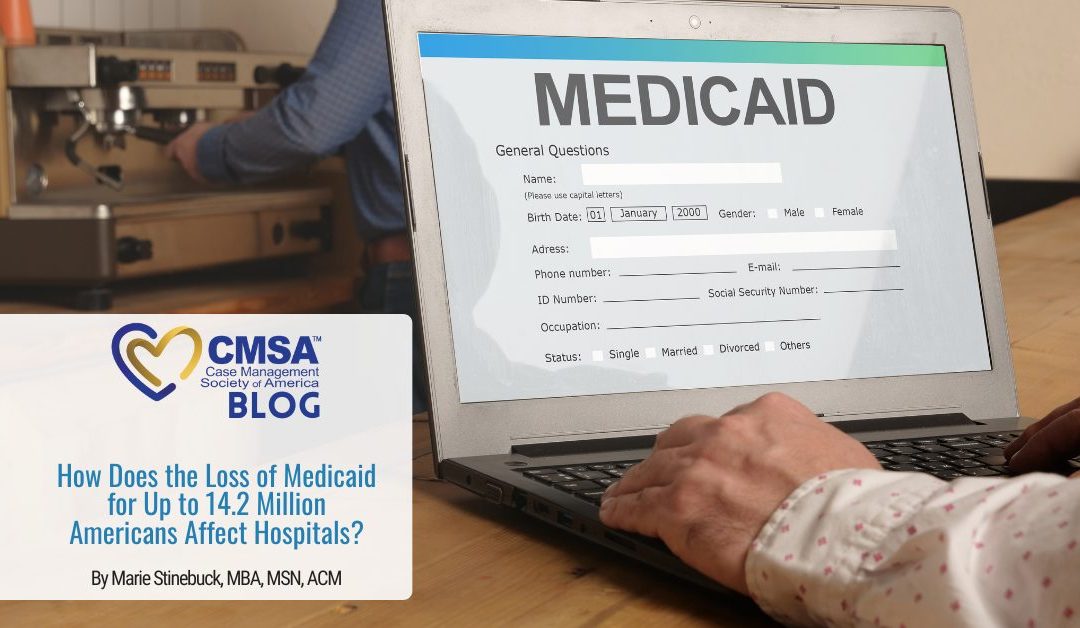By Marie Stinebuck, MBA, MSN, ACM
April 1, 2023, may have felt like any other day, but it was not. It began the unwinding and re-enrollment process for Medicaid beneficiaries due to the ending of the COVID-10 Public Health Emergency (PHE). According to the Department of Health and Human Services, it is expected that up to 14.2 million enrollees may be unenrolled over the next several months as Medicaid reviews member eligibility. So, what does this mean for acute care hospitals, case management, and most importantly, for the individuals losing their Medicaid coverage? And what will the effects be on providers who treat Medicaid patients, inpatient, outpatient, and community providers?
During COVID, The Families First Coronavirus Response Act required states to provide coverage for enrollees. Throughout COVID, states were not required to verify financial qualifications for enrollees. These guidelines were put in place to ensure that individuals and families would not go without healthcare during the pandemic. Medicaid grew by over 25% during the pandemic which equates to over 20 million enrollees across the country. Now that the PHE has ended, states must begin Medicaid re-enrollments. Although this is now required, the decision on how the unenrollment process occurs, and at what pace it occurs initially, will be decided by each individual state. This lack of standardization equates to confusion and misalignment between states and confusion for hospital systems that provide care in more than one state.
By April 2023, states were expected to submit a renewal distribution plan to CMS to outline how they will prioritize renewals, how long they expect the renewal process to take, and strategies to decrease inappropriate coverage loss during this period. Medicaid enrollees are expected to receive the re-enrollment package by mail. If an individual does not receive it by mail, because they moved, they will be dropped from the program due to a lack of response. And because there is no additional follow-up process to communicate with enrollees, beneficiaries may not be aware that they were dropped until they go to use their benefits.
Medicaid beneficiaries need to be proactive to ensure they re-enroll before they are dropped by their state but unfortunately, most enrollees are not likely aware of the changes currently in process and the effects on their coverage. Efforts are in place in each state to create outreach programs and education and provide enrollment assistance for those who remain eligible to retain their benefits. Plans are also being put in place to assist individuals and families to transition to other sources of coverage as appropriate.
How will hospitals be affected and how can hospitals support patients?
The loss of services will result in the delay of care for patients across the Medicaid program. It will affect access to medications and outpatient care and services that prevent patients from being admitted to the hospital. Financially, hospitals will see an increase in self-pay patients due to loss of Medicaid resulting in uncompensated care for hospitals across the country. There will be additional burdens on the financial counselors to follow up with patients to reapply for Medicaid.
Hospitals should reach out to their local Department of Health & Human Services (HHS) office to ensure awareness of local changes and requirements. Registration, scheduling, and financial assistance staff will need to be aware of changes to assist patients with eligibility and submission of required documents. Managed Medicaid plans are more motivated to reach out to their enrollees because they are paid per member based on the number of enrollees based on capitated payments.
Is this really the best we can do?
As I write this blog, I am baffled and infuriated at the same time. To say this is going to be very burdensome to hospitals and a rug pulled out from under the feet of many Americans, some of who are our most vulnerable patients, truly feels like an understatement. For the individuals that unknowingly lose their Medicaid benefits due to the disorganization of the system, I say shame on our system. To think that a child with complex medical needs may lose their benefits because the family moves and does not receive the re-enrollment documents is unacceptable. I am the mother of a child that was born with special needs and fully comprehend the impact of losing coverage during a time when your child may require life-saving care. My solace is knowing that as care managers, we are the patient's advocate and knowledge is power. Take this information back to your organization and determine the next steps to support these patients!
Interested in getting involved in public policy advocacy? Reach out to your local legislators, respond to CMS requests for input, or join the CMSA Public Policy Committee! Learn more at https://cmsapmg.wpenginepowered.com/advocacy/public-policy/
Marie Stinebuck, MBA, MSN, ACM, is the Chief Operations Officer of Phoenix Medical Management, Inc., the leading case management firm. Marie has practiced as a nurse for the past 26 years with 18 years in the field of case management. Marie has served in executive leadership roles with oversight of case management, utilization review, denials prevention, clinical documentation improvement, and medical record integrity. Marie has authored articles for RACmonitor and other case management resources and is a weekly contributor on Finally Friday. She has served as a board member for the Arizona Chapter of the American Case Management Association (ACMA) and holds an MBA, and an MSN in Leadership.

